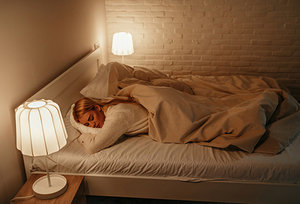Your Sleep Habits Are Making You Fat
By Editorial Staff
A growing body of research (no pun intended) connects how well you sleep with your weight. Inadequate sleep, poor-quality sleep, and even inconsistent sleep-wake times can all contribute to weight gain, usually via food-related mechanisms such as stress-induced eating, skipped meals, nighttime eating, and so on. Here are two more potential culprits when it comes to how your sleep habits can influence weight gain: leaving the TV and/or lights on.
A study involving nearly 45,000 overweight, but otherwise generally healthy women revealed the following: "[Women] who slept with a television or light on in the room were 22 percent more likely to be overweight and 33 percent more likely to be obese than women who slept in total darkness without even a nightlight or the glow from an alarm clock."
 Published in JAMA Internal Medicine, a research journal of the American Medical Association, the study categorized the women's sleep habits at the start of the study as 1) no light; 2) small nightlight; 3) light on outside the room; or 4) light or television on in the room. Women with any exposure to artificial light during sleep were more likely to be obese at the start of the study, and gained more weight during the six-year study period, compared to women with no light exposure at baseline. Other factors that might contribute to weight gain / obesity, such as diet, physical activity, sleep duration and quality were accounted for, suggesting the presence of sleep-time artificial light may indeed be the culprit.
Published in JAMA Internal Medicine, a research journal of the American Medical Association, the study categorized the women's sleep habits at the start of the study as 1) no light; 2) small nightlight; 3) light on outside the room; or 4) light or television on in the room. Women with any exposure to artificial light during sleep were more likely to be obese at the start of the study, and gained more weight during the six-year study period, compared to women with no light exposure at baseline. Other factors that might contribute to weight gain / obesity, such as diet, physical activity, sleep duration and quality were accounted for, suggesting the presence of sleep-time artificial light may indeed be the culprit.
Page printed from:
http://www.toyourhealth.com/mpacms/tyh/article.php?id=2655&no_paginate=true&no_b=true
|

